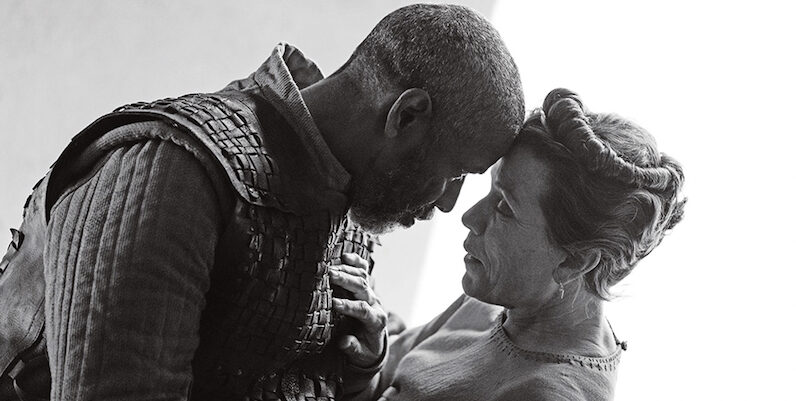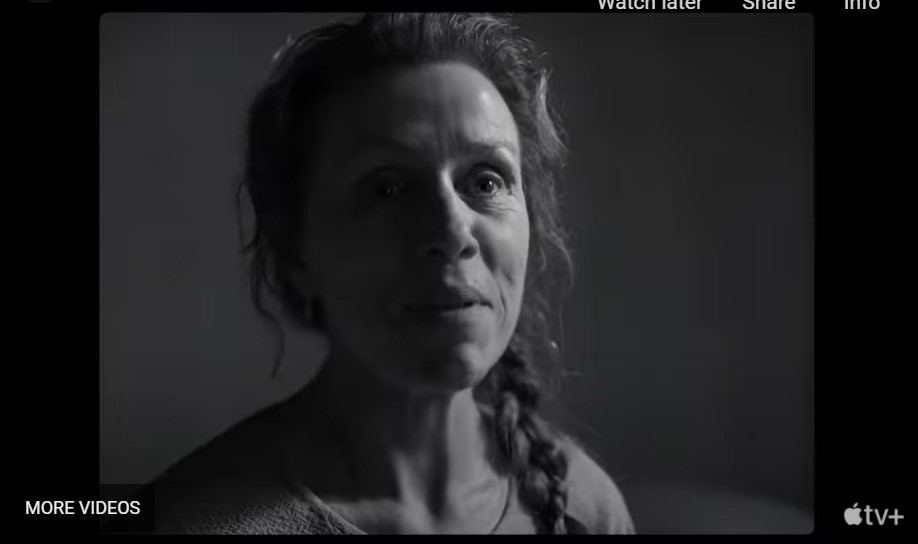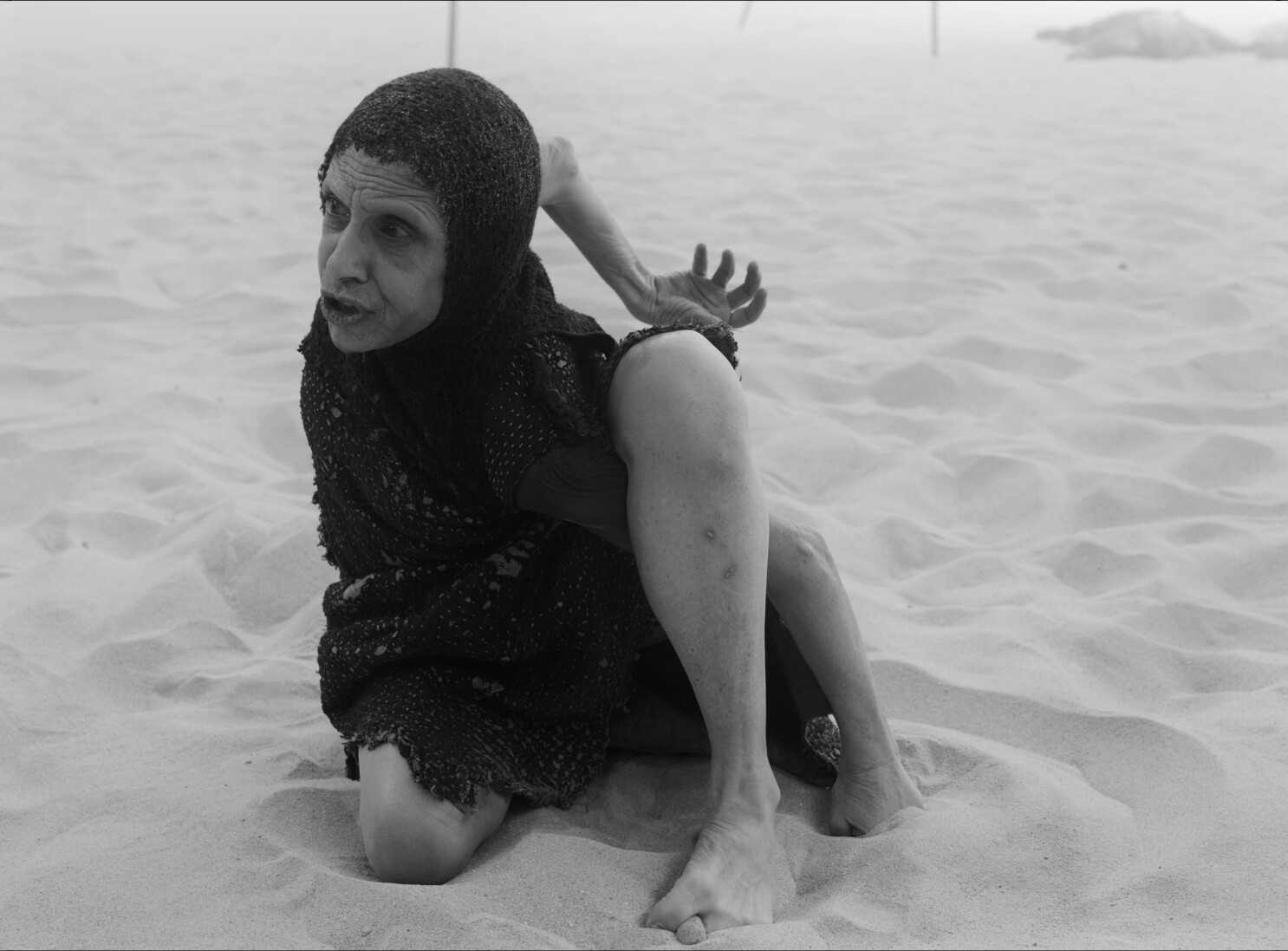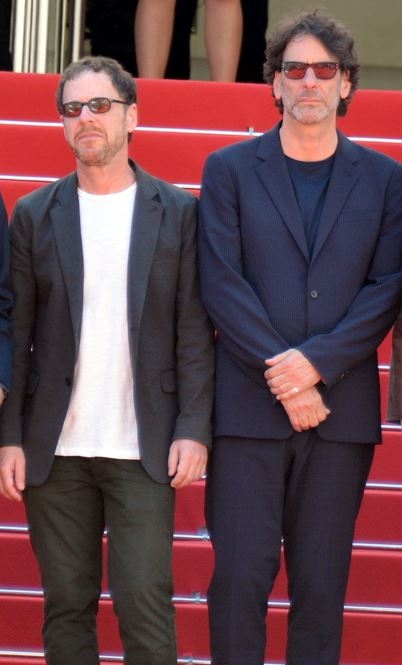️️️***/ ***** 3 out of 5

Ordinarily I don’t review filmed versions of Shakespeare plays. With a handful of exceptions over the years, most fall far short of a live theatrical version. Even a middling stage production is better than most made for the big screen. But when I heard that Joel Coen—one half of the powerhouse Coen Brothers filmmaking team—would be directing a filmed version of The Tragedy of Macbeth, I must admit I was quite excited and eagerly awaited its release. Probably it doesn’t hurt that the last two years have been a virtual Shakespearean desert in NYC. But what got me even more pumped was the announcement that the legendary Denzel Washington would be taking the title role. What could possibly go wrong? Several things, as it turns out, and it only takes a couple wrong turns to taint an otherwise compelling production.
The first component that goes awry in this Macbeth is Frances McDormand, who has had a remarkable career standing on the shoulders of greatness. Married to Director Joel Coen, she is credited as one of the Producers on this film. No problem there. But McDormand has scant experience as a Shakespearian actor and here she’s taking on not only one of the play’s most important roles, but perhaps one of the most important roles in the history of theater.

For the most part, her most celebrated performances have been in Coen Brothers films, having emerged from their first film, Blood Simple, a noteworthy newcomer. Since then the Coens, who have a knack for writing characters tailored to actors they already have in mind, have cast her regularly in their films, making her a star and an Oscar winner. Lucky her.
But Shakespeare has not often (if ever) been in the offing in her very busy career. So, taking on Lady Macbeth, a complex and difficult character to play, is probably not the first place a Shakespearean novice should start. McDormand struggles with the language so much that she loses her character’s grounding, exhibiting little of the emotion for which this character is so known (e.g. a line that Lady Macbeth should hiss vehemently to her husband when he’s reluctant to kill the king: “Screw your courage to the sticking point”, sounds only as impassioned as someone ordering a latte).
In that same vein, Stephen Root my absolute favorite player from the Coen brothers stable, is an utter a misfire as the Porter, who ordinarily brings levity into a very tense moment in the play. He too seems to trip over and mumble his lines to almost zero comic effect. When you compare these two to the rest of the cast, accomplished actors with Shakespeare pedigrees, the contrast is, well, embarrassing.

But there are remarkable moments in this film. Most notable is Kathryn Hunter, who plays not one, but all three witches thanks to the magic of CGI. Hunter, who starred in the Royal Shakespeare Company’s triumphant gender-swapped production of Timon of Athens (a version of which played here at Theater for a New Audience in the winter of 2020), is utterly riveting as the Weird Sisters. Through a croaking voice and physical contortions, Hunter is creepy, enchanting and mesmerizing. She walks toward the camera’s fisheye lens waving her arms about as if they were snakes. Yes, I’m convinced this woman is a witch, a Weird Sister and a Sylph to be feared. Never have I seen such evocative and believable weird sisters, and that includes John Glover’s terrifically comical and mesmerizing performance at Lincoln Center in 2013.
Denzel Washington, as the titular warrior, is magical in his facility with the Elizabethan language and his powerful presence. But it seems he was inexplicably directed (what other explanation could there be—it’s impossible to imagine such a smart actor choosing this interpretation) to almost whisper, nay mumble, most of his lines in the first half of the play (which, for the record, is nothing if not emotional), thereby taking away an enormous portion of the character’s dramatic presence. Had he been allowed to bring the full force of his emotion, this would’ve been an award winning performance. He’ll get an Oscar nomination, no doubt, but I’d be shocked if he were to win.

The Tragedy of Macbeth does have some award-winning elements and most of those are found in its art direction (Jason T. Clark) and Bruno Delbonnel’s cinematography. It’s shot in shadowy black and white where every scene is moody and nightmarish, yet somehow starkly gorgeous, like an Andreas Feininger photograph.
Macbeth is an unusual Shakespeare play. I’ve always felt that it’s almost inverted. So much happens in the first hour of the play that the remaining hour (or so, depending on the production) inevitably seems anticlimactic. There are compelling reasons for this, most having to do with when it was written (shortly after the failed Gunpowder Plot, the attempted assassination of King James and all Parliament). Consequently, Shakespeare tailored the play, among other reasons, to cater to the King’s pleasure. Since James was fond of the occult, and had a notoriously short attention span, Shakespeare front-loaded all of the action, notably, beginning the play with the Weird Sisters (aka, the “witches”). Thus, if King James dozed off or left the play early, he’d still have seen an entertaining and memorable spectacle.
It’s no surprise then that the second half is a challenge and comparatively devoid of action. Coen, largely through heavy, heavy, editing (he probably cut as much as an hour from the play) managed to succeed in making the remainder of the play surprisingly brief. And while his editing was successful, he also committed the cardinal sin of adding to the play. In this instance he took a song used in King Lear and Twelfth Night (“With a heigh ho, the wind and the rain”) and used it to truncate a much longer scene. This just isn’t done. And he also did something I’ve never seen in a Macbeth production when he actually showed Macbeth murdering King Duncan. This, too, is just never done. And with reason. It doesn’t work. Coen’s triumphs in Macbeth are, sadly, counterbalanced by his missteps.
It would be misleading to suggest that The Tragedy of Macbeth is a failure as a filmed production of a Shakespeare play. The bar is already set very high because it’s seldom a successful endeavor. It’s probably a nice entry point for someone, particularly a student, who has never seen Shakespeare before; it’s likely that many will be thrilled by it. The thing that makes it disappointing, however, is that there’s every indication it could have been fantastic. It falls short as a Coen project and does not reach any heights in the pantheon of great Shakespeare films. With the right tweaks here and there, and some alternate casting, it most certainly could have.
The Tragedy of Macbeth. Now playing in movie theaters and streaming on Apple TV+.











